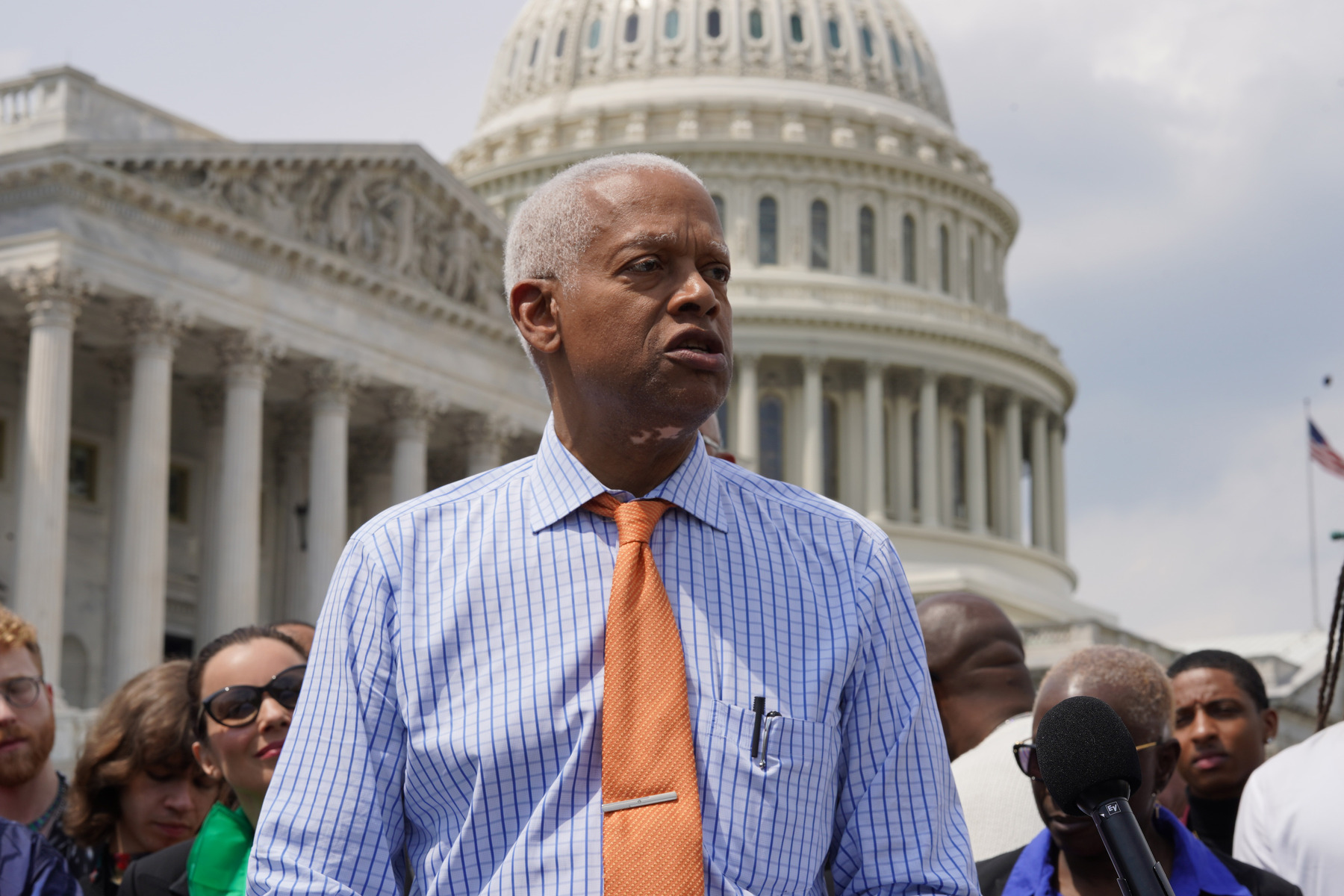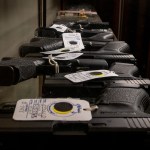At The 19th, we’re committed to publishing journalism that you can trust throughout the critical moments that shape our democracy and our lives. Show your support during our Fall Member Drive, and your donation will be matched. Double your gift today.
Sen. Elizabeth Warren and Rep. Hank Johnson renewed their push for comprehensive gun violence legislation by reintroducing their Gun Violence Prevention and Community Safety Act late Tuesday. This effort was timed around the 30th anniversary of the Brady Bill last week — and the continued toll that gun violence is taking on American lives.
“We’re in a gun violence crisis: 2023 is on track to see the most mass shootings in recent history, and gun violence is now the leading cause of death for children and young people,” Warren, a Massachusetts Democrat, said in sharing the news exclusively with The 19th. “This crisis demands big, structural change to protect kids in schools, victims of domestic violence in their homes, and Americans in communities across the country — so I’m renewing the push for my comprehensive Gun Violence Prevention and Community Safety Act.”
The 281-page bill seeks to holistically address gun violence in the United States. Though it is not expected to pass, it is a clear signal of Democrats’ continued commitment to pushing for gun safety measures, as seen by Vice President Kamala Harris’ discussion of gun violence on her college tour across the country this fall and the White House’s announcement of its new Office of Gun Violence Prevention, also led by Harris.
Johnson, a Georgia Democrat, emphasizes the impact the gun violence epidemic in America is having on women — especially women of color. “It’s painfully obvious that communities of color disproportionately bear the brunt of gun violence in the United States, particularly Black women, who are twice as likely as white women to be fatally shot by an intimate partner,” Johnson said. “We know that more than 4 million women alive today have reported being threatened with a firearm.”
Women in America face a disproportionate threat when it comes to gun violence. Women who are victims of domestic violence are five times more likely to be killed by their abuser when there is a firearm in the home. Over 1 million women alive in America today report having been shot or shot at by an intimate partner in their lifetime; over 4.5 million say they have been threatened with a gun by an intimate partner. Homicide is the number one cause of death for pregnant and postpartum women in America. The majority of these women are killed with a gun, and Native and Indigenous women, Black women, and Latinas are disproportionately impacted.
One of the many components of the bill is the creation of a federal gun licensing system that would require individuals to obtain a federal or qualifying state-issued license to purchase or own a firearm and ammunition. It would also establish a grant program to provide funding for training and state-based gun licensing systems.
Another facet of the bill is strengthening background checks by expanding federal background checks to all gun sales, including at gun shows and by private sellers, closing what is known as the “gun show loophole.” It also would close what’s known as the “Charleston loophole” — named for 2015 shooting at the Emanuel A.M.E. Church in Charleston, South Carolina, that killed nine people — where the shooter was allowed to purchase a gun despite not being legally eligible to do so because his background check was not yet completed. The bill would require a completed background check for all gun sales and mandating reporting of background check denials.

The proposed legislation also would federally ban individuals who present safety threats from buying guns. This includes people who subject to restraining orders, people convicted of misdemeanor stalking offenses or people with outstanding arrest warrants, and it would establish a federal Extreme Risk Protection Order system that allows family members and law enforcement officials to request a court order to temporarily remove guns from individuals at heightened risk of harming themselves or those around them. The bill would also create a grant to incentivize states to implement their own red flag systems.
The Gun Violence Prevention and Community Safety Act would raise the minimum age for buying a firearm or ammunition from 18 to 21, create a seven-day waiting period for all firearm sales, and require that all firearms be sold with a secure storage or locking device. It would also expand the Gun-Free School Zones Act by banning guns on college and university campuses.
One of the other elements of the bill is focusing on the role that assault weapons play in America’s gun violence epidemic by banning military-style assault weapons, large-capacity ammunition feeding devices, bump stocks and trigger cranks and requiring all owners of assault weapons to register them under the National Firearms Act. It would also create a voluntary federal buyback program for military-style assault weapons, large-capacity ammunition feeding devices, firearms silencers, and firearm mufflers. The Gun Violence Prevention and Community Safety Act would also ban untraceable weapons and undetectable firearms — known as ghost guns — by requiring gun kit makers to follow the same rules as other gun manufacturers. It would also ban machines designed to manufacture ghost guns at home in addition to banning the distribution of the instructions or codes for the 3D printing of guns.
The many facets of the Gun Violence Prevention and Community Safety Act bundle into one piece of legislation many of the best practices being advised by gun safety researchers and advocates — and the lawmakers’ reintroduction of it speaks to the growing momentum behind many of these practices being put into practice by state legislatures nationwide. Extreme risk laws — often referred to as red flag laws — have seen a particular surge in momentum. Eighteen states passed extreme risk laws between 2018 and 2023. The Bipartisan Safer Communities Act — signed into law by President Joe Biden in 2022 — created $750 million in new federal grant funding for states, some of which is designed to help implement new extreme risk protection orders. A recent study by the Ad Council found that extreme risk laws are not only popular among Americans, but effective — when people know that they exist.
Likewise, ghost guns have been central to much policy discussion and innovation of late. In 2022, the Biden administration broadened the ATF definition of firearms to include ghost guns, thus subjecting these print-at-home weapons to greater regulation — including that the manufacturers and sellers of of ghost gun kits obtain licenses, mark their products with serial numbers, and conduct background checks on buyers before completing any transactions.
A number of advocacy groups have also offered their endorsement of Gun Violence Prevention and Community Safety Act, including Amnesty International USA, March for Our Lives, The Hotline (formerly the National Coalition Against Domestic Violence), National Council of Jewish Women, States United to Prevent Gun Violence, and Stop Handgun Violence.
Johnson said that “common-sense gun laws” and direct community investments were needed to reduce violence. “I commend Sen. Warren for taking comprehensive action to address the scourge of gun violence in our nation, and I’m proud to reintroduce its companion in the House.”







